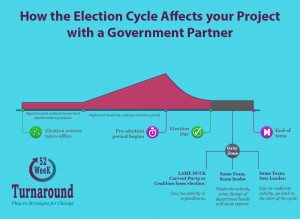
How the Election Cycle can Affect Your Success, Even if You’re Not Running for Office
Not running for political office this year? Then what does the election cycle have to do with you?
Whether you are a multinational corporation, a lean startup, a tiny mom and pop store, or a non-profit agency (NGO), election cycles can have an impact on everything from funding, regulation and licensing, and sales of your product.
If you’re trying to pitch a business product, service or concept to sell to the government, (or an agency closely related to the government) the timing of your pitch and its position in the election cycle can dramatically affect your success.
“But Jeanne, I don’t sell directly to the government or get government funding, so what are you talking about?” Most people don’t realize how connected to government election cycles their client’s purchasing cycles may be, even if they themselves are not selling to the government. So humor me and follow along.
Who are the decision makers in “The Government?”
The first thing to remember is that in most governments there are several types of employees. There are the elected officials, appointed officials (appointed by the team that won the election) and the “civil servants,” more long-term permanent employees that generally do not change with every election. Civil servants may, or may not, owe their original position to having been connected to a winning party in the past. The civil servants have usually been through numerous waves of administration changes which makes them somewhat cautious in their approach to contracting with new services or committing to new projects.
For example, a U. S. state might have a “Tax Commissioner” who actually won an election to get their role. The Tax Commissioner might appoint 1-2 “Deputy Tax Commissioners,” usually close connections or political party allies. Then there are the actual tax assessors, clerks, accountants, appraisers, evaluators etc. who work for the commission. These are usually permanent employees who do not change with every election. Depending on where you live, however, new openings for these jobs may tend to be filled with allies/friends/relatives of the current ruling political group, so sometimes a great deal of political connection is at play. At other times, there is no connection at all, the person just got their job by applying and having the right skills at the right time.
You will generally not get a “quick sale” when you’re selling to the government sector. If you have one meeting to pitch your product and you get an immediate “Yes!”, you’re either sitting down with the President/Prime Minister/Grand Poobah or you’re having a meeting with the wrong person and will be getting a call saying there’s been a “bump in the road” as soon as they get back to the office and tell someone what they promised.
Why is this? Because the number one question on everyone’s mind in a government role, one which often directly or indirectly colors their actions, decisions, and plans, is:
“Who will be in charge, NEXT YEAR?”
Take a look at the infographic above. Election cycles can vary, here in the U.S. most last from 2-6 years, but in other countries the timing may vary. Unless you live in an absolute dictatorship, you probably have some variation on this cycle, but the phases I’ll be talking about tend to be the same. (The US tends to be a two political party system but in other countries you may see coalitions form the “ruling” party, or multi-party systems.)
Here’s how the cycle works:
1. A new party takes office. During this first phase, the newly elected officials will be making appointments to the senior level positions. In a national election, this may take the form of appointments to national cabinet positions, followed by those appointees making leadership appointments at regional and local levels. If you are trying to pitch your product at this time, it may be a frustrating period of “no decision” despite having many meetings or discussions with various department heads. Consider the possibility that they are “auditioning” your idea, hearing you out to see if your idea might be worth pitching higher up the “food chain” once they have a clear idea of the priorities of the new officials.
2. The next phase is a period of high activity, purchasing, and innovation. This is the time period after the appointments have been made, and the goals and priorities of the new administration are going to be executed. If your product serves those goals in a way that can advance the work of the administration, this is the best time to have it gain traction. This is the time when many purchasing decisions will be made, and many government contracts are awarded for services, funding, grants etc.
3. Phase 3 is the pre-election period. This generally takes place about a year before the next election. At this point, every project, plan and purchasing contract is re-evaluated to see if they will help or threaten the ruling party’s chances of getting back into office. Projects and products that advance the goals of the administration and have measurable benefits will generally be expanded or promoted. Projects and products with a high chance of public perception of failure will be cut back or hidden from view. If you are pitching a product that has any possibility of public failure, one that requires a long time to drive measurable results, or is very costly, it is highly unlikely that it will be adopted at this time. Generally this is a time of scaling back, with high focus on certain key activities, and low adaption of new partners, products or processes. There are rare exceptions to this, they are usually tied to exceptional events, such as a terrorist act, a natural or man-made disaster or an economic crisis of extraordinary proportions, such as the one that began in 2007. If you are pitching something new at this time, you may encounter a similar feeling as we saw in phase one, “lots of meetings, no decision.” You may have a great deal of difficulty even getting the meeting. Just prior to, and during this period, it is not unusual to see many appointed department heads depart for the private sector, able to use their expertise to negotiate a lucrative package with corporations that do business with the government. If your product or service is at all controversial, this is NOT the time it will get taken on.
4. It’s Election day again! At this point we enter one of three phases (I like to call it the gray zone).
- Possibility one: This is the “Lame Duck” scenario. The current party or coalition is NOT reelected. Nothing will get done, and there will not be any major expenditures until the new team takes office.
- Possibility two: Current Party is re-elected with the same leader. Thee will be some changes of appointees as many will opt to move to the private sector or to think tanks, and there may be a slight refocus of priorities based on discoveries made during the election period.
- Possibility three: Current party is re-elected but with a new person at the top. Go back to the beginning of phase one.
As you can see, the timing of your approach can greatly affect the speed of your success. Remember when I mentioned that even if YOU don’t sell directly to the government your clients might? If you run an office supply store and a large portion of your customers are receiving government subsidies for their work, ebb and flow in election cycles can really affect your sales. You may not even realize how many of your customers are direct government suppliers, or one step away from the government. In this case, the office supply store owner is one step away. His/her declining sales may affect his suppliers, truckers or even his/her ability to pay rent. On the other hand, a new government regulation requiring every government file to be in a purple folder will spur a spike of purple folder sales that might just get that office supply store owner a nice tropical vacation this year.
Related to this topic:
1 Lean Startups in Government agencies
2. Presentation on Lean startups in Government agencies: YouTube 1, You Tube 2, You tube 3.
3. What does a Government Shutdown mean for you? What if the government is your biggest customer?
4. Are you selling what they need to hear? Be sure you’re pitching what the government needs at the right time!
5. Need some great questions to ask to help you size up any business environment? Go here. And get your FREE COPY today!

What are YOUR tips on pitching the government on a business idea or project? Share in the comments section.